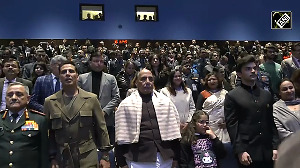Modi was merely responding to the changing currents in the region which, unfortunately, are not favourable to the Palestinians, says P R Kumaraswamy.

Capitalising on the prevailing political conditions in the Middle East Prime Minister Narendra Modi has irreversibly transformed the century-old Indian policy on Palestine.
The writing was clear since August 2015 when Modi chose the United Arab Emirates as his first port of call in his Middle Eastern diplomacy. The India-UAE joint statement, which contained as many 31 areas where both leaders agreed, had no reference to Palestine.
The same was true in the statements issued at the end of his visits to Iran (May) and Qatar (June) in 2016. However, given Saudi sentiments, the Palestine issue had a mention when he visited Riyadh in April that year.
In the past, the Palestine issue figured prominently in India's political engagements with the Middle East, but this is no longer the case under Modi.
Similarly, from early 2015, India began distancing itself from the Arab bloc in various United Nations bodies over resolutions that were critical of Israel.
Though it did not vote against them, it no longer sided with the Arabs on issues like Israel's human rights situation or Jewish claims to Jerusalem.
A more decisive shift came during President Mahmoud Abbas's visit to New Delhi in May when the Indian government formally dropped any references to 'East Jerusalem being the capital' of the future Palestine State.
Until then, various bilateral and multilateral statements, as well as public pronouncement of President Pranab Mukherjee and Vice-President Hamid Ansari, had references East Jerusalem.
With Abbas standing next to him, on May 16, Modi declared: '...We hope to see the realisation of a sovereign, independent, united and viable Palestine, co-existing peacefully with Israel. I have reaffirmed our position on this to President Abbas during our conversation today.'[
This does not mean India switched its position or planning to accept Jerusalem as the 'eternal and undivided capital' of the Jewish State. Far from that.
It only meant that New Delhi has recognised the complexity of the problem as Jerusalem evokes historic, geographical, theological, archaeological and political claims and counter-claims.
So far, both Israel and Palestine are not prepared to recognise the claims of the other and India seeks a solution based on mutual respect, accommodation and compromise.
The de-hyphenation was complete when Modi opted for a standalone visit to Israel.
Since External Affairs Minister Sushma Swaraj announced in May 2015 that the prime minister would visit Israel, there were hopes and expectations that he would follow the traditional balancing and visit both Israel and Palestine.
This line of argument was strengthened when President Mukherjee (October 2015) and (January 2016) also visited Ramallah.
However, from the beginning of this year, there were clear indications that Modi will move away from the traditional balancing and skip Ramallah.
This became formal when he hosted President Abbas a few weeks before the Israel trip.
The only reference to Palestine during Modi's Israel visit came towards the end of the 22-point joint statement which said: 'The two Prime Ministers discussed the developments pertaining to the Israeli-Palestinian Peace Process.'
'They underlined the need for the establishment of a just and durable peace in the region.'
'They reaffirmed their support for an early negotiated solution between the sides based on mutual recognition and security arrangements.'
This is a compromise position. Like much of the international community, India is committed to the two State solution whereby Israel and Palestine would coexist side by side with peace and security.
In recent months, the Israeli government under Benjamin Netanyahu has been distancing itself from this without addressing the central issue of Palestinian Statehood.
The Indian bottom line is clear: No unilateralism on the part of either side.
Thus, within the span of three years, Modi has transformed India's Palestine policy; dropped references to Palestine in India's bilateral engagements with the Middle East; abstained on UN votes; abandoned stating 'East Jerusalem as the capital' of the future Palestinian State; and finally skipped Ramallah.
How could he do this?
An easy and simple explanation would be to locate it within the context of Hindutva as some have done.
Ideological convergence between the Indian and Israeli Right, the argument goes, enabled Modi to follow this policy.
In their view, an Israel-Palestine balance is critical and should not be allowed to be diluted due to the ideological conventions of the Indian leaders.
The argument is powerful and if located within the domestic context even convincing, but it is a simplistic and insufficient explanation and hence exhibits unfamiliarity with the Middle Eastern reality.
Two things are essential to remember. There is an inbuilt dichotomy between Modi's domestic and foreign policy orientations.
Internally, he is seen to be pandering or at least passive towards the Hindutva agenda and its proponents.
Electoral consideration prevails over the rest, and hence he is often accused of not responding swiftly to various 'crisis' situations.
In the foreign policy realm, Modi presents himself as an inclusive statesman driven primarily by his developmental agenda and not by preconceived prejudices or ideological blinders.
Whether China-Japan, Iran-Saudi Arabia or the Israel-Palestine equations, he avoided siding with one against the other.
His approach has been economic cooperation than military alliances.
Had Israel been his first port of call upon becoming prime minister, it would be possible to accuse Modi of pursuing a narrow ideological agenda.
This is not the case.
He visited other countries in the region, hosted their leaders and politically engaged with the wider Middle East before embarking on his visit to Israel.
Indeed, since May 2014, senior Indian leaders, namely the President, vice-president, prime minister, external affairs ministers or ministers of state visited all the countries of the Middle East with the sole exception of Libya.
To be fair to him, Modi is far less driven by ideological blinkers than some of his foreign policy critics within the country.
More importantly, Modi was responding to the Middle East reality which is not favourable to the Palestinians. Much of the Arab world is preoccupied elsewhere.
Territorial integrity, regime survival, combating extremism, and tackling youth unemployment are far more important for many of these countries than the statelessness of the Palestinians.
Not the Palestinian cause has lost its relevance, but its importance has dwindled and is overtaken by other challenges.
The survival of the Syrian State, for example, is more important to President Basher al-Assad than Palestinian Statehood.
Even the Iranians are concerned over their inability to meet the raising expectations of the population due to falling oil prices. Hence, not many countries or their leadership were surprised by Modi's itinerary.
Furthermore, intra-Palestinian unity is abysmal, to say the least.
Last month marked the 50th anniversary of the Six-Day War of June 1967. Unfortunately, occupation and prolonged statelessness proved to be insufficient to bring about an internal unity, not uniformity, among the Palestinians.
Indeed, for over a decade the Palestinians have been forcing the international community to choose between the West Bank controlled by the Fatah-led Palestine National Authority and the Gaza Strip administered by Hamas.
This, in turn, has weakened the Palestinian negotiating position as well as its priorities.
If Israel and its occupation could not bring about internal unity and cohesion, what else would?
It is within the larger Middle Eastern context of lowering the importance of the Palestinian cause in inter-Arab politics and internal Palestinian squabbling that one should locate Modi's decision to skip Ramallah as well as his silence on the Palestine issue during his Israel visit.
He was merely responding to the changing currents in the region, which, unfortunately, are not favourable to the Palestinians.
Professor P R Kumaraswamy teaches contemporary Middle East in the Jawaharlal Nehru University, New Delhi.
IMAGE: Palestinians with posters of the late Palestinian leader Yasser Arafat and Palestinian flags during a rally. Photograph: Ammar Awad/Reuters











 © 2025
© 2025